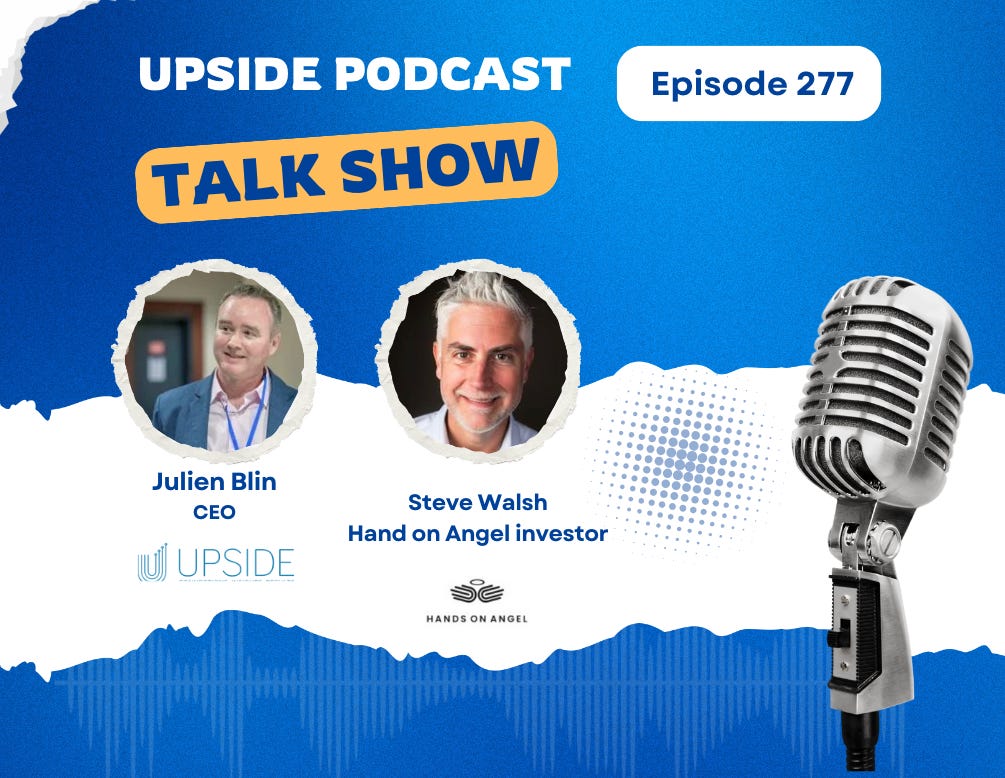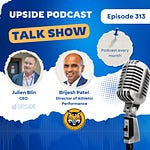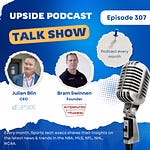Today we have the honor of interviewing Steve Walsh, and hand on angel investor in Sports and Tech.
Steve Walsh isn’t just another name in the startup ecosystem—he’s a powerhouse mentor and investor who’s redefining what it means to support early-stage companies. As a Techstars' Mentor-in-Residence and the founder of Hands On Angel LLC, Steve has poured his energy, expertise, and capital into over 60 promising startups, helping them not only secure millions in funding but also build invaluable connections that propel them to success.
What sets Steve apart? It’s his unparalleled, “hands on” approach. He doesn’t just write checks; he rolls up his sleeves and dives into the trenches with founders, becoming personally invested in their journey. With a network bursting with strategic relationships and partnerships, Steve is the ally every founder needs in their corner.
Discover more about his mission at Hands On Angel.
You can watch the video interview below by clicking on the Youtube link. You can also listen to the audio interview by clicking on the link at the top of the page:
📝Show Notes: In our interview with Steve Walsh, we touched on several key themes that shaped his journey and perspective as an angel investor. We explored his background and what led him into angel investing, particularly within the sports tech space. He shared his investment philosophy, explaining how he evaluates early-stage startups, manages risk, and focuses on providing value beyond capital. We also discussed some of his favorite investments, where he highlighted the qualities in founders and technologies that impressed him most. Walsh then explained why he chose to focus on sports tech and how he sees the sector evolving compared to traditional tech verticals. Finally, he offered practical advice for founders, stressing the importance of preparation, real traction, humility, and coachability when pitching to investors.
You can read the full transcript of the podcast interview with Steve located at the top of this blog post.
Here are the quotes from the interview with Steve:
Q1. Background & Journey
"My journey is a little different than most angel investors. I spent over 20 years as an operator in the US broadband space, working for two of the largest companies in the world. I helped grow one from nothing to a billion-dollar business and another to $10 billion, which was exciting. But after two decades, running a $500 million business unit with 200 people reporting to me wasn’t fun anymore, and at 46, I wasn’t ready to retire. I’d always been a big investor in public and private markets, so I started exploring alternative assets like wine and art. Then it hit me—why not use my experience in scaling businesses to help the next generation of entrepreneurs? That’s when I began angel investing. I’d show up at demo days telling founders, ‘I’ve got capital, a massive network of super-helpful people, and two decades of experience building businesses—do you need any of this?’ At first, people looked at me like I was crazy, but that’s really where it all began about eight years ago."
Q2. Investment Philosophy
"My investment philosophy has definitely evolved. When I first started eight years ago, I was investing broadly—I wanted to learn, so I dipped my toes into all kinds of sectors. But the longer you do this, the more you realize your thesis needs to narrow, because you begin to recognize what good really looks like. For me, that’s B2B, SaaS, Sports Tech, and Fitness Tech—spaces I understand, am passionate about, and where I know I can add value. I don’t just write checks; anyone can provide money. I look for early-stage companies with real traction, maybe $10,000 or more in monthly revenue—something that shows me they have customers beyond friends and family. If I invest, it becomes my mission to see how my network can accelerate their growth. Maybe they need introductions for distribution, sales, or fundraising. Maybe they’ve got a gap in go-to-market or legal. My role is to help fill those gaps quickly so they can grow faster. To me, that’s the responsibility of an angel investor—protecting the investment by helping the founders succeed."
Q3. Favorite Investments
"One of my favorite sports tech investments is Fitbod. I discovered it as a user before AI was even part of everyday conversation. It’s essentially like having a professional trainer in your pocket—tracking your workouts, monitoring recovery, and guiding what you should do next. What impressed me most was the founder. When I asked why he was raising capital, he told me the company was already profitable and throwing off free cash flow. He didn’t need the money; he just wanted to accelerate growth. That mindset—raising only to go faster, not to survive—was incredibly appealing. Today, Fitbod is doing $25 million a year with 300,000 users and has never raised another round. That’s what I mean by capital efficiency and humility. Another favorite is Rook, a company that built an API connecting over 300 wearables so the data can be used seamlessly by insurers, trainers, and sports teams. When I told the founder Marco that he needed to reincorporate in Delaware and move operations to the US if he wanted to raise venture capital, he literally sold his house in Latin America, moved his family to Miami, and did it. That level of commitment—being willing to do whatever it takes—is what separates great founders from the rest. You really do have to be a little crazy to succeed as a founder, and I love backing people like that."
Q4. Focus on Sports Tech
"Sports tech has always been a passion for me because I was an athlete, I played college lacrosse, and I’ve spent my life surrounded by sports. So it was a natural area to focus on. What’s really interesting is how the sector has evolved. Eight years ago, very few teams were seriously investing in technology. Maybe you’d see an owner doing deals quietly on the side. Today, it’s completely different. Nearly every major sports team now has an investment arm, a venture fund, or a sidecar strategy. And it’s not just about on-field performance. Teams are investing in venue technology, food services, operations, fan engagement—anything that can give them a competitive edge. I mentor with Techstars, and I’ve seen firsthand how accelerators with teams like the Minnesota Twins are focused on not only sports tech, but venue and operational tech as well. That shift—teams putting innovation at the center of their growth strategy—has been one of the biggest changes I’ve seen in the sector. Sports tech is no longer on the periphery; it’s at the heart of how organizations think about staying ahead."
Q5. Advice to Founders
"The best advice I can give to sports tech founders—or any founder—is simple: be better in every aspect. That means being prepared when you meet an investor. I can’t tell you how many times I get on a call and a founder knows nothing about me, when they could have spent 30 seconds on LinkedIn or YouTube learning who I am and what I invest in. Do your homework—it matters. Second, don’t raise money too early. Wait until you have paying customers. A waitlist, non-paying users, or letters of intent aren’t traction. Traction is revenue. Fundraising should be about pouring gas on a fire that’s already burning, not about trying to spark one. And finally, be humble. Investors have options. You need the money, not the other way around. If you come across as arrogant, it’s not going to work. Coachability is one of the most undervalued traits in founders. If you’re not humble and willing to learn, how are you going to grow from two employees to 20, to 100? The founders who are prepared, revenue-driven, and humble—the world is their oyster."
You may also like:











